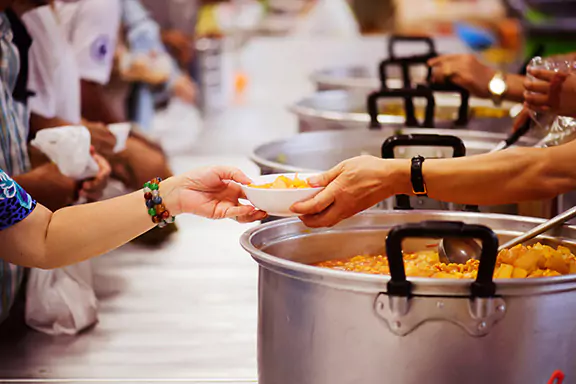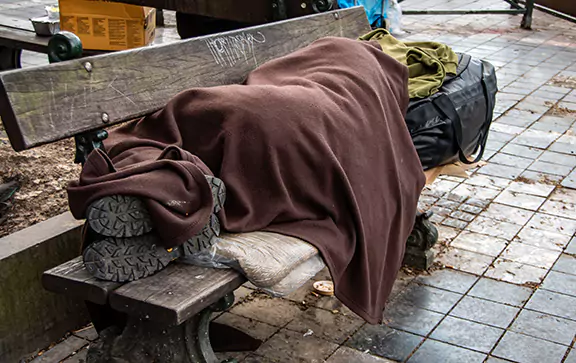Finding yourself without a home could be terrifying and overwhelming. This helpless feeling could make it hard to think clearly about your options. But take a deep breath. This situation is not hopeless.
In this blog post, we’re discussing resources that provide food, shelter, healthcare or mental health services, and support. Things likely look bleak but you’re going to get past this. With some practical guidance, you’re bound to be back on your feet soon. Stay strong. Help is out there if you know where to search.
Tips to Stay Safe While Homeless
If you find yourself without a place to call home, your safety and security become top priorities. Some tips to help you stay safe on the streets:
Avoid Going in Dangerous Areas
Know the locations in your city that are known for criminal activity or violence and avoid them, especially at night time. Stick to well-lit, populated areas as much as possible.
Don't Display Your Valuables
Don’t flash your cash, jewelry or expensive electronics that could make you a target. Keep your belongings concealed and close to you. Consider using a backpack to store essential items.
Stay in a Group
There is safety in numbers on the streets. Try to connect with local shelters or outreach programs that may be able to link you up with others in a similar situation. Look out for each other, and try to avoid being alone, especially after it gets dark.
Be Careful Trusting Anyone
There’re people who prey on the vulnerable. Be very wary of unsolicited offers of food, money, shelter, or transportation. Especially if you struggle with mental illness, don’t confide in or trust people you recently met. Even if it seems as though they want to help, you never know someone’s true intentions unless you know them. Typically, only accept help from verified charities and outreach organizations.
Maintaining Hygiene: Places to Bathe and Do Laundry
When living on the streets, hygiene and cleanliness can be challenging to maintain but are extremely important for your health care, safety, and wellbeing. Some options for bathing and doing laundry:
Homeless shelters: Many homeless shelters and outreach programs offer showers and laundry services either on-site or with vouchers to local facilities. These homeless services are often free or low-cost. Check with programs or an emergency shelter.
Gyms: Some gyms such as the YMCA offer short-term or day passes that provide access to showers. Prices range but are often very affordable. If cost is an issue, explain your current situation.
Community centers: Public pools, community centers, campgrounds, and truck stops frequently have showers available for a small fee, around $5 to $10. If there are any in your area, they can be a good option.
Laundromats: For laundry, many laundromats, especially smaller neighborhood ones, would work with individuals in need. Some may allow you to clean clothes in the sink if you can’t afford machines.
Do-it-Yourself Laundry: Baby wipe baths and sink showers are temporary options if other facilities are unavailable. Be very careful to properly clean your body to avoid skin irritation.
Getting Spare Food From Restaurants or Grocery Stores
When you’re homeless, finding your next meal can be challenging. Don’t be afraid to ask local restaurants or grocery stores if they have any spare food they’re willing to donate.
Approach restaurant managers or store owners politely and explain your situation. Some places could be willing to give you any unsold food right away. Others could ask you to come back at closing time when they’re cleaning up for the night.
Bakeries, pizza places, and sandwich shops are often good options since they frequently have extra food that won’t stay fresh until the next day. Grocery stores can also be a good resource for snacks, prepared meals, or food that’s dented or close to its “best by” date.

Soup Kitchens, Food Banks and Other Resources
Many programs or organizations offer resources to provide food to those in need:
Soup Kitchens or Food Banks
If you’re homeless and struggling to afford meals, soup kitchens and food banks can provide nutritious food at no cost. Soup kitchens offer hot meals, usually for dinner. Food banks distribute nonperishable items, produce, and sometimes prepared meals. Search online for “soup kitchens” and “food banks” in your area to find locations and hours. Many churches, shelters, and charitable organizations offer these services. Don’t hesitate to use them—the food is there to help people in need.
Government Assistance
The government offers benefits like Supplemental Nutrition Assistance Program (SNAP) and welfare (TANF) to help homeless individuals afford food and other essentials. SNAP provides monthly funds for groceries. TANF provides temporary financial assistance for things like food, housing, childcare, and job training. Requirements and benefits vary by state, so check with your local government agency to apply and see if you qualify.
Check Your Local Shelters
Homeless shelters are designed to provide temporary housing, but many also offer meals, healthcare, job assistance, and other social services. Drop-in centers are good options if you don’t need overnight housing. Explain your situation, and the staff should be able to connect you with resources to help you access food and meet other needs. Some shelters allow you to stay for up to 2-3 months so you have a stable place to get back on your feet.
There are kind people and organizations that want to help. Reach out for available resources in your area. A full belly and a roof over your head can make all the difference in improving your situation. Stay positive, keep applying to assistance programs, and don’t be afraid to ask others for help. There are always alternatives and people here to support you.
Transitioning Out: Long-Term Housing Solutions and Rental Assistance
Once you’ve found temporary housing, it’s time to look for more permanent solutions so you can get back on your feet. The 2 main options are affordable housing programs and rental assistance.
Government housing assistance programs, like public housing or subsidized units, provide lower-cost housing for those with low incomes. Public housing is government-owned, while subsidized units are privately owned but receive government funding to lower rents. Waiting lists can be long, so apply as soon as possible. Some places give priority to veterans or families.
Rental programs, such as Section 8 vouchers, help make private housing more affordable. The vouchers subsidize a portion of your rent, allowing you to find an approved place within your budget. You pay 30-40% of your income toward rent and utilities, with the voucher covering the rest. The waiting list for Section 8 can also be quite long, so get on it right away.
Build your case for assistance by gathering documents like IDs, birth certificates, income statements, eviction notices or letters from social workers regarding medical or disability issues. The more details you’re able to provide about your situation, the better.
Consider moving to an area with lower costs of living and more available low-income housing options if needed. Some smaller cities and towns may have additional resources and shorter waiting lists for programs like Section 8 vouchers or public housing.
If experiencing domestic violence caused your homelessness, work on resolving these types of problems that prevent you from staying in your home. There’re resources such as America’s National Domestic Violence Hotline (a national call center to assist with domestic violence) or your local police police to help.
Homeless or at Risk? Receive Some FREE Benefits!
If you’re reading this blog, you’re likely either at risk of becoming homeless or already living on the streets. Don’t worry — it happens all the time. Luckily, EASY Wireless is here to help!
Partnering with programs such as Lifeline, we’re offering FREE phones with data to eligible individuals like yourself. Whether you need to keep in touch with friends & family or you want to just save money on your current plan, here’s what we’re offering:
EASY Wireless Unlimited Plan
FREE Unlimited Data
FREE Unlimited Talk
FREE Unlimited Text
FREE SIM Card Kit and Activation
Choose to Keep Your Number or Get a New One
See if you are eligible for FREE cell phone service, Click here!
Or you can come to one of the EASY Wireless’s retail stores, where our customer service agent will help you apply for your benefits.


